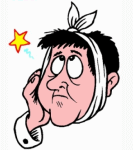
Denture Pain
Denture pain is a common problem among denture wearers. Pain associated with wearing dentures can be prevented by following the dentist’s instructions about proper use, care and maintenance. However in some cases the denture pain problems can be solved only by relining or replacing the denture.
What causes denture pain?
Dentures are removable prosthetic devices that are used to replace missing teeth. Denture pain usually affects patients either in the first period of having a new restoration or/and after several years of using it without problems. The etiology may be different in the two cases, but the causative factor is in most cases that the denture does not fit properly on the gums and jaw.
Denture sores pain due to improper fit
Dentures have a pink-colored base made of acrylic resin that resembles the gums and they stand on the gums over the alveolar ridge. The soft tissues of the mouth are among the most sensitive of the human body. If the denture does not fit properly it will move during chewing, continually rubbing on the gums and eventually creating sore spots. If the denture is not repaired, the sore spots can become ulcerated and very painful.
Loose dentures are the most common cause of denture pain. An ill fitting denture can be so uncomfortable when chewing or talking that may become almost useless. Another cause of denture pain due to improper fit is that hard food particles can get between the gums and the base of the denture and cause a wound on the gums.
New dentures - A poorly made new denture that its base does not match exactly to the shape of the jaw bone ridge can damage the gums causing soreness, bleeding, and open wounds in the gums. Even a properly made denture may also cause problems, if the dentist has not allowed enough time for the gums and jaw bone to heal after the tooth extractions usually made prior to the denture placement. When natural teeth are extracted the jaw bone begins to shrink due to bone resorption. If the dentist places the denture before the bony ridge is stabilized after about 3-6 months, the denture will soon become loose and require adjustment.
Old dentures – Bone resorption and gum shrinkage will continue beyond the first months but at a smaller pace. A denture will need some minor adjustment (reline) every 2-3 years. After some years the shape of the jaw has changed to a degree that the proper fit can not be restored. The denture becomes loose causing soreness, discomfort and pain.
Denture pain due to chewing pressure
When you have your teeth, the pressure of chewing is administered on teeth and through them to the hard jaw bone. When teeth are lost and replaced by a denture, the chewing pressure is administered to the denture appliance. But this time between the denture and the jaw bone there is the soft gingival tissue. If you bite hard foods the pressure can be too much for the soft gums causing a sharp pain. This type of denture pain is normally only temporary, but if the pressure points are constantly irritated, the gums may become ulcerated causing more pain.
Denture pain due to bruxism
Bruxism is the habit of grinding or clenching the teeth. In both cases the gums get irritated due to rubbing or pressure causing denture pain.
Allergies
Some people are allergic to denture materials or to cleansers and adhesives. These allergies can irritate the gums and cause painful mouth ulcers. If you have an allergic reaction you will need a new denture made by other materials or alternative cleaners and adhesives.
Oral Thrush
Oral thrush (stomatitis) is a condition characterized by white lesions on the tongue and cheeks caused by a fungal infection of the mouth. Wearing dentures that are not properly fitted in combination with poor oral hygiene can be responsible for developing oral thrush. Normally there is only mild pain. But sometimes oral thrush lesions become painful, especially if their surface is irritated or scraped by the constant contact with a loose denture. Several other factors such as a weak immune system and smoking can increase the chances of experiencing denture pain due to oral thrush lesions.
Denture Pain caused by Burning Mouth Syndrome
Burning mouth syndrome (stomatodynia) is a painful condition described as a burning or scalding sensation in the tongue, and other mouth tissues. Poorly fitting dentures that damage the surface of the mouth’s tissues or sensitivity to their material are common burning mouth causes. The syndrome occurs most commonly in middle-aged or older women denture wearers.
Sores on the mouth or gums that are constantly irritated by dentures do not only cause denture pain but can also lead to more serious health problems such as oral cancer.
![]() Check your mouth for any red or white patches, changes in the gums color or denture sores that do not heal, even if you do not feel denture pain.
Check your mouth for any red or white patches, changes in the gums color or denture sores that do not heal, even if you do not feel denture pain.
![]() If you have any of these symptoms visit your dentist for an oral examination and denture repair.
If you have any of these symptoms visit your dentist for an oral examination and denture repair.
How to relieve and prevent denture pain?
Denture pain is a common concern especially in the first few days after having a new denture. The following suggestions can help relieve and prevent denture pain:
![]() Allow Your Gums to Rest - Do not wear your dentures all the time.
Remove your dentures for at least six hours every day to give enough time to your gums to rest and heal from any irritation. If you have denture pain due to sore spots try not to wear them for a few days until the sores heal.
If your dentures have become extremely painful, do not wear them until you can see your dentist, to avoid worse damage to the gums.
Allow Your Gums to Rest - Do not wear your dentures all the time.
Remove your dentures for at least six hours every day to give enough time to your gums to rest and heal from any irritation. If you have denture pain due to sore spots try not to wear them for a few days until the sores heal.
If your dentures have become extremely painful, do not wear them until you can see your dentist, to avoid worse damage to the gums.
![]() Denture repair
- Dentures must be checked yearly and adjusted (relined) every 2-3 years in order to fit properly to the continuously changing shape of the jaw bone ridge and gums.
They should be replaced every 5-6 years. Avoid home repair kits because you may cause more damage to your gums and denture if not used properly.
Denture repair
- Dentures must be checked yearly and adjusted (relined) every 2-3 years in order to fit properly to the continuously changing shape of the jaw bone ridge and gums.
They should be replaced every 5-6 years. Avoid home repair kits because you may cause more damage to your gums and denture if not used properly.
![]() Pain medicines
- Using an over-the-counter topical pain medicine such as Orajel can help relieve temporarily the denture pain until you visit the dentist for denture adjustment.
Pain medicines
- Using an over-the-counter topical pain medicine such as Orajel can help relieve temporarily the denture pain until you visit the dentist for denture adjustment.
![]() Use adhesives
– Using adhesives to hold the dentures in place can help decrease the movement of the denture and minimize sore spots and denture pain.
Use adhesives
– Using adhesives to hold the dentures in place can help decrease the movement of the denture and minimize sore spots and denture pain.
![]() Keep your dentures clean
- Dentures must be kept clean to avoid bacteria build up. Brush them thoroughly with a denture cleanser before you go to bed, then place them in a glass of water overnight.
Bacteria can promote gum irritation, oral thrush and delay the healing of sore spots.
Keep your dentures clean
- Dentures must be kept clean to avoid bacteria build up. Brush them thoroughly with a denture cleanser before you go to bed, then place them in a glass of water overnight.
Bacteria can promote gum irritation, oral thrush and delay the healing of sore spots.
![]() Keep the mouth clean
- The mouth may also be kept clean, not only the dentures. Good oral hygiene is important even if the natural teeth have been lost.
If you have developed mouth sores wash the mouth with salt water two or three times a day to prevent infection and soothe denture pain.
Keep the mouth clean
- The mouth may also be kept clean, not only the dentures. Good oral hygiene is important even if the natural teeth have been lost.
If you have developed mouth sores wash the mouth with salt water two or three times a day to prevent infection and soothe denture pain.
![]() Avoid hard foods
- Prefer soft, easy to chew foods, especially for the first weeks you have new dentures.
By the time the mouth will adjust to the dentures and you will be able to eat more comfortably.
Avoid hard foods
- Prefer soft, easy to chew foods, especially for the first weeks you have new dentures.
By the time the mouth will adjust to the dentures and you will be able to eat more comfortably.

 Dental Insurance
Dental Insurance Tooth Extraction Pain
Tooth Extraction Pain Toothache Medicines
Toothache Medicines